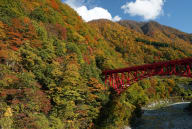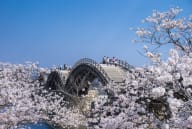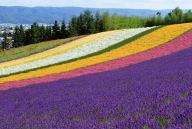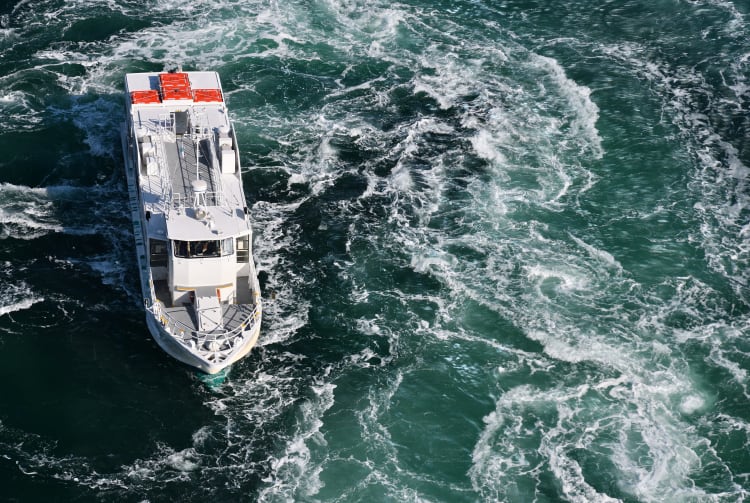Des tourbillons sur la mer intérieure de Seto
Balayé par certains des courants les plus rapides au monde, le détroit de Naruto mesure 1,3 kilomètre de large et se situe entre Naruto dans la préfecture de Tokushima et l'île d'Awaji dans la préfecture de Hyogo .
Lorsque les eaux de la mer intérieure de Seto rencontrent les courants opposés de l'océan Pacifique dans le canal de Kii à marée haute et à marée basse, on assiste à l'un des phénomènes les plus uniques de la nature : les tourbillons de Naruto. Les visiteurs qui se rendent sur place peuvent les observer dans toute leur puissance depuis le pont Onaruto qui enjambe le détroit, ou depuis l'un des nombreux bateaux de tourisme ou points d'observation du port.
À ne pas manquer
- La passerelle Uzu-no-Michi à panneaux de verre, sous le pont Onaruto
- L'observatoire de Senjojiki, lieu idéal de détente et de chasse aux souvenirs
- L'historique temple Ryozenji, première destination du pèlerinage bouddhiste de Shikoku
- Le musée d'art Otsuka, situé à proximité, qui propose des reproductions grandeur nature de joyaux historiques majeurs

Comment s'y rendre
Depuis la gare de Tokushima ou la gare de Naruto, prenez un bus local pour Naruto Park. Si vous voyagez en avion depuis l'extérieur de la région, un service de bus est disponible depuis l'aéroport de Tokushima Awaodori. Il vous conduira à Naruto en 40 minutes environ.
Avec des ponts importants reliant Honshu et Shikoku via l'île d'Awaji, Naruto est accessible depuis les principales villes de la région du Kansai en bus. Le trajet en bus de Kobe à Naruto dure environ 1 h 20. Au départ d'Osaka, comptez environ 2 h, et de Kyoto environ 2 h 30.
Anecdotes
Les courants du détroit de Naruto sont les plus rapides du Japon
Le meilleur moment pour observer les tourbillons : à marée basse au printemps et en automne
Les tourbillons peuvent atteindre jusqu'à 20 mètres de diamètre
Les tourbillons ont inspiré un personnage de manga (Naruto Uzumaki) et une décoration culinaire pour ramen (Narutomaki)
Rapidité des courants
L'étroitesse du détroit de Naruto et sa topographie sous-marine font varier les marées entre la mer intérieure de Seto et le canal de Kii jusqu'à 1,5 mètre à mesure que l'eau traverse le détroit à une vitesse d'environ 13 à 15 km/h. La marée est généralement plus forte au printemps et en automne lorsque l'eau qui traverse le détroit à une vitesse pouvant atteindre 20 km/h crée des tourbillons de près de 20 mètres de diamètre.
Étant donné que le cycle marée haute / marée basse se répète toutes les six heures environ, le meilleur moment pour observer les tourbillons de Naruto variera selon le jour et les conditions. Vérifiez au préalable les informations relatives à la marée, qui sont mises à jour en ligne.
Aventurez-vous dans le détroit en bateau
Pour apprécier cette force incroyable de la nature, plusieurs possibilités s'offrent à vous : l'une des plus populaires est d'embarquer sur un bateau de tourisme et de prendre la mer pour voir les tourbillons de près, depuis le pont. La coque de certains bateaux est même équipée de panneaux de verre situés en dessous du niveau de la mer pour une vue sous-marine des plus époustouflantes sur les tourbillons. Ces bateaux offrent un panorama magnifique sur Naruto et le paysage côtier environnant.
Ces croisières touristiques s'avèrent raisonnables en termes de coût (environ 2000 yens par adulte), ne nécessitent pas de réservation et sont programmées régulièrement tout au long de la journée.
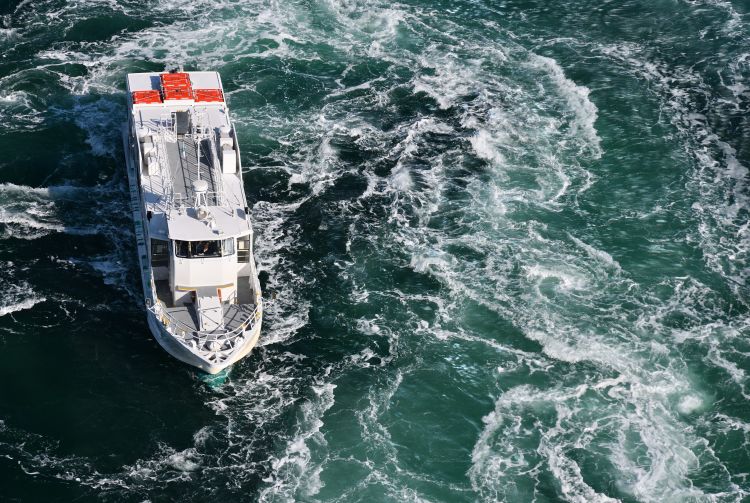
Voir les remous d'en haut
Une autre option prisée consiste à observer les tourbillons de Naruto en surplomb. Construite sur le pont inférieur du pont Onaruto, qui relie Tokushima à l'île d'Awaji , la passerelle Uzu-no-Michi, longue de 450 mètres, est munie d'un sol en panneaux de verre robustes qui vous permettent de regarder les tourbillons se former et se mettre en mouvement. Suspendue à 45 mètres au-dessus de la mer, elle offre une vue plongeante spectaculaire qui permet d'observer plusieurs tourbillons d'un seul coup d'œil.
Plus haut, encore plus haut et plus loin pour une vue panoramique
Après avoir profité de la vue d'en haut sur le pont Onaruto, dirigez-vous vers l'observatoire de Senjojiki pour admirer le pont dans son intégralité, ainsi que le magnifique paysage naturel entourant le détroit de Naruto. Si vous souhaitez vous y rendre, empruntez l'escalator de 68 mètres qui mène à la terrasse d'observation Eska Hill Naruto pour une vue panoramique saisissante à 360 degrés du paysage.
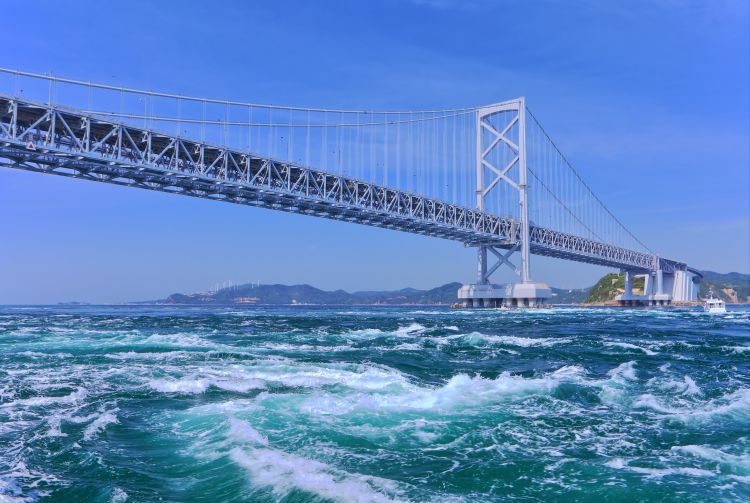
Chefs-d'œuvre millénaires au plus grand musée d'art du Japon
Après avoir admiré les merveilles indomptables de la nature au détroit de Naruto, rendez-vous au musée d'art Otsuka tout proche. Avec le plus grand espace d'exposition au Japon, il abrite une collection vaste et variée, comprenant plus de 1000 reproductions de chefs-d'œuvre historiques allant de la sublime chapelle Sixtine de Michel-Ange à l'emblématique Guernica de Picasso. Il est intéressant de noter que ces reproductions ont été réalisées en céramique, afin de résister à la décoloration et à l'usure du temps.




























